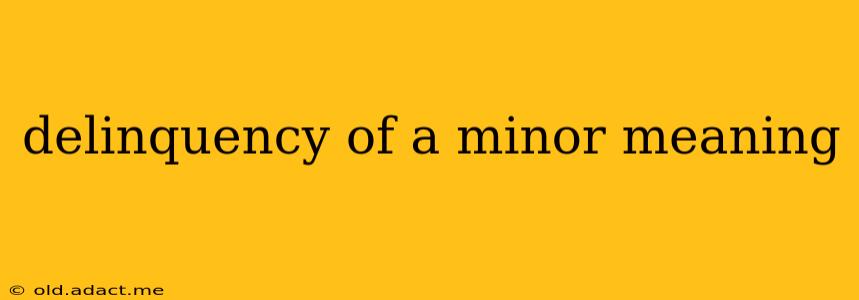Delinquency of a minor, in its simplest terms, refers to illegal or harmful behavior committed by a child or adolescent who is legally considered a minor. This is a crucial concept in juvenile justice systems worldwide, with definitions and consequences varying across jurisdictions. Understanding this concept requires exploring its legal nuances and societal implications.
What constitutes delinquency?
The specific acts considered delinquent vary significantly depending on location and local laws. However, common examples include:
- Crimes: Actions that would be considered criminal offenses if committed by an adult, such as theft, assault, vandalism, or drug offenses. The severity of the crime will greatly impact the consequences for the minor.
- Status Offenses: These are acts that are illegal only because the person committing them is a minor. Examples include truancy (skipping school), running away from home, and underage drinking or smoking. While not criminal acts for adults, these behaviors are seen as potentially harmful or indicative of underlying issues requiring intervention.
- Neglect or Abuse: In some cases, the delinquency label might apply to minors who are victims of neglect or abuse, particularly if their situation contributes to their engaging in illegal activities. These instances highlight the complex interplay between societal factors and juvenile delinquency.
What is the difference between delinquency and criminal charges?
A key distinction lies in the legal process. While both involve illegal behavior, delinquency proceedings take place within the juvenile justice system, which aims for rehabilitation and reform rather than solely punishment. Criminal charges, on the other hand, are brought against adults in the adult criminal justice system, with a focus on punishment and retribution. The age of majority, determining when a person transitions from the juvenile to the adult system, varies by jurisdiction.
How is delinquency handled by the juvenile justice system?
The juvenile justice system aims for rehabilitation and reintegration into society. Common interventions include:
- Probation: Supervised release with conditions aimed at positive behavioral change.
- Community Service: Performing unpaid work for the benefit of the community.
- Counseling or Therapy: Addressing underlying issues contributing to delinquent behavior.
- Residential Placement: In more serious cases, placement in group homes or juvenile detention centers.
- Educational Programs: Focusing on improving academic performance and life skills.
What are the long-term effects of a delinquency record?
A delinquency record can have significant long-term consequences, impacting education, employment opportunities, and even future legal proceedings. The implications can vary depending on the severity of the offense and the jurisdiction's record-sealing laws.
Can a juvenile delinquency record be expunged?
The possibility of expunging (or sealing) a juvenile delinquency record depends on local laws and the specific circumstances of the case. Some jurisdictions allow for the sealing of records after a certain period, especially if the minor successfully completes probation or other court-ordered programs. This is designed to give minors a second chance, preventing past mistakes from permanently hindering their future prospects.
What are some common causes of delinquency?
Understanding the root causes of delinquency is crucial for effective prevention and intervention. Factors often cited include:
- Family Dysfunction: Including poverty, abuse, neglect, and parental substance abuse.
- Peer Pressure: Influence from peers engaging in risky behaviors.
- Lack of Educational Opportunities: Contributing to disengagement and frustration.
- Community Factors: Such as poverty, lack of resources, and exposure to violence.
How can delinquency be prevented?
Prevention strategies require a multifaceted approach involving:
- Strengthening families and communities: Providing support and resources to families and communities facing challenges.
- Improving access to education and resources: Ensuring all youth have opportunities to succeed.
- Early intervention programs: Identifying and addressing at-risk youth before they engage in delinquent behavior.
- Positive youth development programs: Fostering positive relationships and opportunities for youth.
Understanding the meaning of delinquency of a minor requires acknowledging the complex interplay of legal definitions, social factors, and the long-term consequences for involved individuals. By implementing effective prevention and intervention strategies, societies can strive to reduce juvenile delinquency and promote the well-being of their youth.
